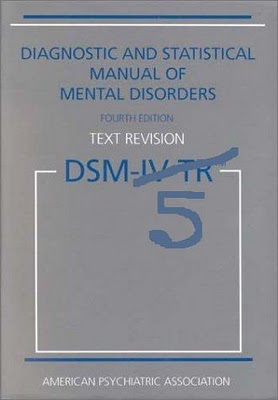The last word on this may not yet be said, but the people shouting victory over what for The American Psychiatric Association is a big step but just a very tiny one for humankind, means some clear language is needed to provide an exit out of this quagmire of pathologisation, half depathologisation and repathologisation.
Once upon a time, some twelve years ago the latest edition of the DSM saw the light: DSM-IV-TR. A text revision of the DSM IV that is even older (1994). There transgender was classified under 302.x “Gender Identity DIsorder” Jawohl, a full fledged mental disorder. Before it was transsexuality. Also something not be happy with. You had to suffer quite a lot, and conform to the descriptions in bible of transsexuality, Harry Benjamin’s Transsexual Phenomenon, absolutely feel The Other Gender, from the moment you had any self perception. You wanted to be a woman (mostly, sometimes a man). You may live in a homosexual relationship but was because you actually were a woman, so it was straight after all.
In the DSM-IV one was to have strong negative reactions to one’s body, one’s role in society, one’s clothing; sexual preferences also played a role; it was recorded and mostly your becoming gay (post-transition) would be negative specifier.
The current edition now has some improvements. The identity itself is not a disorder anymore, only the dysphoria counts. They say. However this is not all true. To start with: GD gets a category of its own. The positive element in this is it is not placed anymore among the sexual or paraphilic disorders. But why does it need a place in DSM anyway? Because we want treatment costs covered? Then it should be in a medical manual. Since the APA itself also claims the identity is not a disorder, it should have no place. And the mental problems that come from (outside or inside) transphobia don’t need a trans specifier.
To be able to get medical assistance as trans in a country that uses the DSM (and many do) a diagnosis is needed that you experience severe dysphoria, a strong conflict between your anatomy and the idea of who you are. And of course the strong conviction to be of the “the” other gender. That also applies for the Netherlands, not quite so progressive as it sees itself.
Several countries, not the least the USA, use the DSM for their insurance reimbursement and coverage criteria. Where these insurance companies are commercial molochs that have an interest in covering as little as possible, weird things as gender dysphoria only qualify if they exist as a reference/entry in a diagnostic manual. Practically this leads on the one hand to trouble for those who need access and cannot pay for themselves. Ultimately this is a grave and structural human rights violation that takes place in some of the most developed countries. This costs lives.
On the other hand – and not as a compensation but a parallel development – the model that trans* is mostly and heavily relying on medical technology, is less strong there. Other ways to live as trans, other transsexual technologies are found and used. Emphasis may lie stronger on the expression and less on the genitals. Different ways of living their trans life are invented. After all centering on hormone treatment and surgery is something that is only a recent possibility. With diminishing the logic of “trans, thus medical intervention is needed”is othing wrong. With keeping the same rationale for recognition under the new description and still needing medical gatekeepers, all is wrong.
What is needed is an approach that recognises the social-psychological character of gender diversity and takes its departure ppoint in heping the client with what they indicate they need: moslty adaption to growing in their deeply felt identity. Confirmation, not criticising. Help with overcoming the results of transphobia and cisgenderism. This may include medical interventions, but does not need to. When needed, this must be available at a high level of competence and be imbursed by health insurance. Governments should take also trans* related medical assistance within the default care package they regulate imbursement for.
